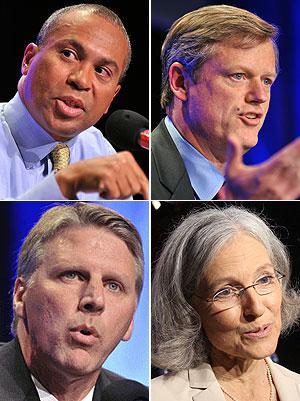Advertisement
Our Next Governor: On Health Care
Resume
It’s a top priority for all four candidates for governor but it is getting little attention as an issue. The issue is health care — specifically, rising costs that threaten state, municipal, business and some family budgets. There are stark choices in the candidates’ approach to tackling health care costs.
All four candidates propose significant changes in health care. They range from putting everyone in a government health plan to rolling back parts of the landmark coverage law. On one end of the spectrum there’s Green-Rainbow Party candidate Jill Stein, who argues in debates for getting rid of health insurers to make care more affordable.
Stein's Health Care Plan: Get Rid Of Insurers
"The biggest waste that we can cut out of health care is insurance waste," Stein says.
"There’s one system that will cut through that waste and bring down the cost: that's single-payer, also known as Medicare for All. It works."
So there’s one option, no more insurance companies, everyone has coverage that looks like Medicare. Gov. Deval Patrick argues for another big change, not as big as Medicare for All, but a change that would still rock health care in the commonwealth.
Gov. Patrick And Global Payments
"The idea, in oversimplified terms is to move from paying for the amount of care to paying for wellness," Patrick explains. "There are models for this where we’ve seen costs managed down, and managed down, not just for the industry, but the actual cost to the consumer."
In the health care world this change is called global payments. Doctors and hospitals would have a budget with bonus payments for keeping patients healthy. They would stop getting paid for every test and procedure. A state commission that included many health care leaders recommended moving in this direction, but in hospitals and doctors offices there is anxiety and some resistance.
Patrick says he's ready.
"Every time we make a significant change we face resistance and I think I’ve shown I’m willing to stand up to resistance if that’s for the greater good," Patrick says.
"If we don’t get control of health care costs and balance that with my view of health as a public good, then a lot of things we’re interested in doing in the commonwealth and the country won’t happen."
Patrick says he’s “very proud” of and committed to the state’s universal coverage law. So there’s your option from the Democratic incumbent: no major changes to the landmark coverage law, but big changes in how we pay doctors and hospitals.
Baker: Post Prices, Let Market Force Costs Down
Now, the Republican challenger.
"I don’t think we can solve the affordability problem until we deal with what I call the transparency problem," says Republican gubernatorial candidate Charlie Baker.
Baker, unlike Patrick, says he would not push for global payments that put doctors and hospitals on a budget. Baker says the problem isn’t how doctors and hospitals are paid, it’s the veil that hides how much they are paid.
"If you and I drive 20 minutes in any direction from here and I go in and I get the same service with the same outcome, the price of that service can vary by as much as 500 percent," he says. "There’s no public disclosure around what anybody gets paid or how they perform."
Post the prices, argues Baker, for an MRI or a normal delivery or knee surgery and watch market pressure force costs down. Baker, as the former head of Harvard Pilgrim Health Care, says he has the expertise to get tough with providers. Baker supports the state's universal coverage law, but he would get rid of some insurance requirements, such as prescription drug coverage. Baker says the requirements make insurance too expensive, especially for small businesses.
"I think that’s a mistake, I think we should go back to giving people the kinds of choices they had before that they were happy with," Baker says.
So there’s the Baker option: less expensive, but probably less comprehensive health insurance and posting prices to drive down the cost of care.
Cahill: Fewer Insurance Mandates
Independent candidate and state Treasurer Tim Cahill agrees with Baker that the state should relax the rules about what insurance must include.
"We have to give people more choices and lessen the number of mandates on our basic plan," Cahill says.
Cahill says he would let Massachusetts residents buy insurance policies outside the state that cover, for example, only really expensive or catastrophic treatments.
There’s a perception in the health care world that Cahill would try to repeal the health coverage law.
But Cahill says, "I don’t think we have to dismantle [the law], that would be my last option. I think we have to fix it and I think we can improve it. We’re not going to be able to subsidize as many people with as much subsidization, and that’s something that everyone’s got to understand because we’re not in an environment or an economy where we can give things away for free."
Cahill is open to discussing global payments, the health care budgeting idea Patrick supports. But he’s worried the change could force hospitals to cut jobs.
"I don’t want to hurt the industry, the health care industry is one of our biggest employers, so I don’t want to do anything that’s going to hurt employment there to grow employment elsewhere, but I think there’s a balance we need to take," Cahill says.
Finding that balance that slows spending on health care without losing vitality and jobs in that sector will be a challenge for the next governor…regardless of his or her approach to controlling health care costs.
This program aired on October 18, 2010.
